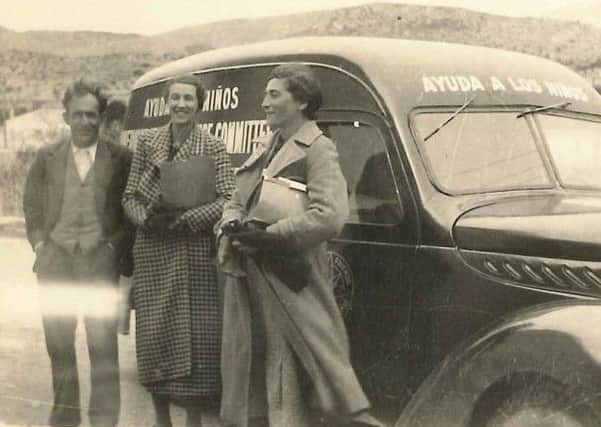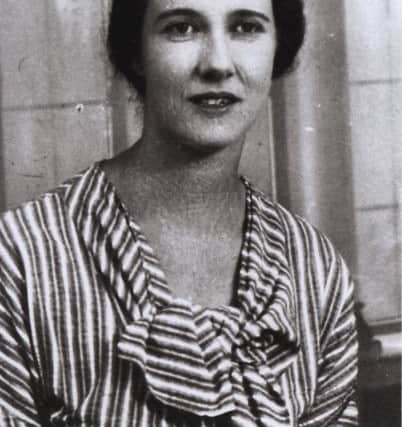Roamer: Irish woman is righteous among the nations for WWII Jewish rescue missions


Last month’s Holocaust Memorial Day was marked on this page with a little-told account of the thousands of Danish Jews who were ferried to safety in Sweden by a heroic taskforce of tiny Danish rescue-boats.
It was a story of great courage less commemorated worldwide than the Jewish exoduses achieved by better-known giants of humanity like German industrialist Oskar Schindler and British stockbroker Sir Nicholas Winton.
Advertisement
Hide AdAdvertisement
Hide AdThere are many, many thousands of similar accounts where Jews were saved from Hitler’s genocide by heroic, selfless, rarely-hailed rescuers.


Some 25,000 rescuers from over 40 countries are remembered and honoured by Israel as The Righteous Among the Nations, a title bestowed on non-Jews who risked their lives during the Holocaust saving Jews from Hitler’s extermination camps.
The names of The Righteous are recorded on the Wall of Honour, or commemorated by a tree, in the Garden of the Righteous at Yad Vashem in Jerusalem.
The name Yad Vashem comes from a verse in the Old Testament - ‘and to them will I give in my house and within my walls a memorial and a name (a yad vashem)... that shall not be cut off’ - from the Book of Isaiah, chapter 56, verse five.
Advertisement
Hide AdAdvertisement
Hide AdOskar Schindler is thus honoured, and so is the Polish nurse and social-worker Irena Sendler, recounted here last Wednesday.


Sir Nicholas Winton’s name isn’t on the Wall of Honour as he was Jewish, but he has been awarded with numerous other greatly esteemed honours and acknowledgements.
The Danish Underground, including the sailors who navigated the exodus to Sweden, requested that its members who rescued Jews should not be listed individually, but should be commemorated as a group.
So there’s an outdoor sculpture of a little Danish boat in The Garden of the Righteous!
Advertisement
Hide AdAdvertisement
Hide AdAnd there is one Irish name amongst the 25,000 at Yad Vashem, officially recorded in file number 12543 as Mary Elizabeth Elmes.
The file states that Cork-born Mary’s Righteous Among Nations medal was awarded on January 23, 2013 for her WWII rescue missions at Pyrenees-Orientales.
Her religion is recorded as Catholic; her job-title in France is specified as Head of Emergency, Quakers; her married name was Danjou; date of birth was 5 May 1908, in Cork, Ireland, and date of death was 9 March 2002 in Perpignan, southern France.
Before the war, Mary excelled at languages at Trinity College Dublin and after further studies at the London School of Economics she joined the London Ambulance Unit in February of 1937.
Advertisement
Hide AdAdvertisement
Hide AdDuring the Spanish Civil War she worked in a children’s hospital in Almeria on the Iberian Peninsula.
When the Friends (Quakers) Service Council took over this work she stayed on until the Civil War ended in 1939.
In May of that year Elmes joined thousands fleeing over the Pyrenees into France, where she continued her work with the Quakers.
She organised food rations and supplied refugee children with educational books.
Advertisement
Hide AdAdvertisement
Hide AdWhen WWII started the American Friends Service Committee was working in the south of France, with Quakers from other countries also providing relief in camps built for refugees from the Spanish Civil War.
By 1940, as the German army occupied the northern part of France, the numbers in the camps swelled massively with refugees fleeing the German advance.
The population of Toulouse increased from 200,000 to almost a million and food was in desperately short supply.
With Britain at war with Germany, British Quakers were forced to leave France, their work left to a small band of American, Dutch, Danish, Norwegian and Irish nationals - including three women, Mary Elmes from neutral Ireland and her Norwegian colleagues Alice Resch and Helga Holbek, all working for the Quaker relief organisation though not Quakers themselves.
Advertisement
Hide AdAdvertisement
Hide AdThey and their little team fed over 7,000 refugees daily, including 800 children, in camps, hospitals and children’s colonies.
Much of their work was in the Rivesaltes Camp, southern France where, according to an official report at the time, after only a morsel of bread and a sip of tea in the afternoon “the children remain without a gram of solid food from six o’clock in the evening until the following day at noon.”
Tuberculosis was prevalent, and mortality was high, particularly amongst the young, elderly and infirm.
Barefooted, half-naked children fainted at school, their stomachs distended from malnutrition.
Advertisement
Hide AdAdvertisement
Hide AdAs war progressed the vast majority in the camps were Jewish and mass deportations to the death camps began.
Rivesaltes Camp became a ‘sorting house’ for Jews.
Mary Elmes and Alice Resch manipulated exit visas for many of the children, transferring them to safer children’s colonies. Mary often smuggled the little ones out, hidden in the back of her car.
With America now in the war, by November 1942 all of the remaining US Quaker aid-workers had been ordered to leave France.
Resch, Holbek and Elmes and a few others remained, adopting the name Les Secours Quakers - The Quaker Rescue.
Advertisement
Hide AdAdvertisement
Hide AdThey continued looking after the children, and at great risk to themselves, kept smuggling them to safety.
In 1943 Elmes was arrested and imprisoned for six months, but wasn’t charged.
On her release she returned immediately to her children, explaining afterwards - “We all experienced inconveniences in those days, didn’t we?”
All three women were subsequently named as Righteous Among the Nations, Mary being the only person in Ireland to receive the honour.